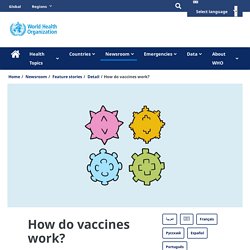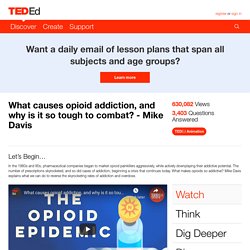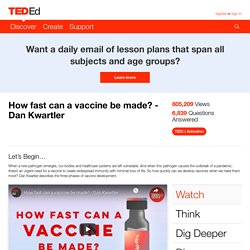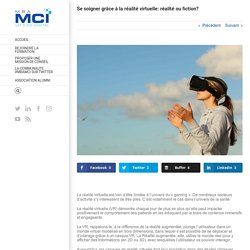

How do vaccines work? This article is part of a series of explainers on vaccine development and distribution.

Learn more about vaccines – from how they work and how they’re made to ensuring safety and equitable access – in WHO’s Vaccines Explained series. Germs are all around us, both in our environment and in our bodies. When a person is susceptible and they encounter a harmful organism, it can lead to disease and death. The body has many ways of defending itself against pathogens (disease-causing organisms). Women in medicine through time.
Women in medicine. Vaccine pioneers british english student ver2. Vaccination Slides. Many people believe that it is better to let our immune system fight an infection naturally, or that without getting infections our immune system will get weaker.

But without vaccines you may get serious or even life-threatening infections. Do you think natural immunity is better? I agree. Although our immune system is designed to defend us from infection, it is not fool-proof and sometimes an infection can be fatal. To let your immune system 'give it a go' might end in very serious or fatal consequences. Just because your immune system is not fighting a life-threatening infection, doesn't mean it's getting weaker.
Learn about a mum who chose not to vaccinate her daughter against measles, and the outcome of her choice. I don't agree. Vaccinations are a lot safer than contracting serious or potentially life-threatening infections. Many young people are concerned about the pain of a needle. Does this concern you? You answered yes. The needle will sting! You answered no.
Antibiotic Guardian Quiz. Antibiotic Guardian Challange Crossword. Antibiotic Guardian Crossword 2. Vaccination debate kit. Antibiotics debate kit. 9789240560277 1 Vaccinate. Anti-vaccination activist charged in Samoa, amid measles outbreak. Measles cases in Samoa decreasing drastically due to mandatory vaccine law. Measles epidemic: ‘A very sad time for Samoa’ as death toll rises. Samoa measles outbreak: At least 60 dead, mostly children under four. Samoa’s escalating measles crisis -difficult. What causes opioid addiction, and why is it so tough to. Since the mid 1800’s scientists have struggled to find effective pain killers that did not create addiction in their patients.

Heroin was one of the first synthetic opiates that claimed to be more effective at reducing pain without addiction. Oxycodone is one the most recent compounds to make the same claim. Unfortunately, neither were valid. Both of these compounds were attempting to separate the pain relieving (analgesic) from the pleasure inducing (euphoric) effects. Through heroin there was an attempt to make a chemical modification to the morphine molecule. This separation is very complicated.
Naloxone is also an opiate, however, it has the opposite effect. The complicated chemistry and neurobiology of the situation is a big part of the problem, and it is something that we have very little control over. Chronic pain management is a burden for many people, and the appropriate use of drugs like these can bring some relief. Help is available. How fast can a vaccine be made? - Dan Kwartler.
The first vaccination was created in 1798 by Edward Jenner.

He began his work in 1796. Why do vaccines take so much time to create? In times of new pathogens, its critical to understand how quickly vaccines can be creed in order to minimize loss of life. Health Affairs published an article in 2005 on the history of vaccines. Réalité virtuelle et augmentée : chirurgie high-tech et traitements psychiques révolutionnaires. Tout commence en 1994 avec le chirurgien Jacques Marescaux, qui intègre pour la première fois le téléguidage par l'image en chirurgie. L'opération, dite "mini-invasive", est réalisée grâce à l'introduction d'une caméra dans le corps du patient via une petite incision.
La même année, Jacques Marescaux fonde l'IRCAD (Institut de Recherche contre les Cancers de l'Appareil Digestif), un centre de référence de renommée mondiale en la matière. En 2001, il opère depuis New York une patiente située à Strasbourg à l'aide d'un robot téléguidé. Quelques années plus tard, en décembre 2017, la première opération intégrant un casque de réalité augmentée a lieu.
Le chirurgien orthopédique Thomas Grégory est assisté par un hologramme via le casque Microsoft "HoloLens" pendant une opération de l'épaule. Se soigner grâce à la réalité virtuelle: réalité ou fiction? Traitement des syndromes de stress post traumatique Le projet Bravemind à l’initiative du Professeur Skip Rizzo de l’Université de Californie du Sud exploite les bénéfices de la réalité virtuelle dans le cadre du traitement du syndrome de stress post-traumatique (SSPT) parmi les vétérans de guerre.

En plongeant l’individu dans des scénarios similaires à ceux rencontrés en mission, Bravemind constitue une forme immersive et évoluée du traitement classique. En plus des stimuli visuels, des bruits, des odeurs et des vibrations spécifiques peuvent s’ajouter pour rendre l’expérience plus réaliste. L’environnement est entièrement contrôlé par des médecins formés qui maintiennent une conversation constante avec le patient. La thérapie développée par le Dr Rizzo, pionnière, est aujourd’hui utilisée dans plus de 50 sites dont des hôpitaux et bases militaires.
CO measles in Samoa (1)